External links
- Personal webpage Archived 2016-03-06 at the Wayback Machine
Malathi de Alwis (6th Oct 1963-21 Jan 2021, also known as Mala de Alwis) was a Sri Lankan anthropologist. She taught at the International Centre for Ethnic Studies and the Faculty of Graduate Studies at the University of Colombo. She wrote about militarism, nationalism and feminism.
De Alwis earned her PhD in socio-cultural anthropology from the University of Chicago, where she was a founding member of the Women Against War Coalition and a winner of the Ruth Murray Memorial Prize for Best Essay in Gender Studies.[ citation needed ]
De Alwis was a senior research fellow at the International Centre for Ethnic Studies in Colombo, Sri Lanka. She also taught as a visiting professor at The New School in New York City. [1] She also taught in the MA Program in Women's Studies at the Faculty of Graduate Studies, University of Colombo. [2]
She wrote about feminist issues such as militarised sexual violence and the memorialisation of grief. [3] [4] Writing with Kumari Jayawardena, she explored how traditional perspectives in gender can become fixed during times of conflict, commenting "fundamentalism uses women's bodies as a battlefield in its struggle to appropriate institutional power". [5] In 2014, de Alwis produced an exhibition with photographer Sharni Jayawardena called "Invoking The Goddess: Pattini-Kannaki Devotion in Sri Lanka" at the India International Centre in New Delhi. [6]
{{cite web}}: CS1 maint: unfit URL (link)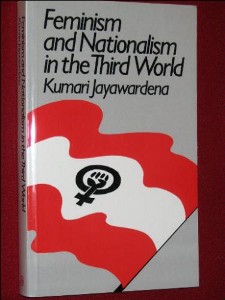
Feminism and Nationalism in the Third World is a 1986 publication by Sri Lankan author Kumari Jayawardena. Kumari's book has been described as a feminist classic and widely used in gender and women's studies to date as a primer of Third-World Feminism.

Kumari Jayawardena is a Sri Lankan feminist activist and academic. Her work is part of the canon of Third-world feminism which conceptualizes feminist philosophies as indigenous and unique to non-Western societies and nations rather than offshoots of Western feminism. She has taught at the University of Colombo and the International Institute of Social Studies.
Sunila Abeysekera was a Sri Lankan human rights campaigner. She worked on women's rights in Sri Lanka and in the South Asia region for decades as an activist and scholar. Quitting a career as a singer, Abeysekera briefly joined the Janatha Vimukthi Peramuna and then founded the Women and Media Collective in 1984. As head of the INFORM Human Rights Documentation Centre, she monitored human rights violations by all parties in the civil war. She received the United Nations Human Rights Award in 1999 and the Didi Nirmala Deshpande South Asian Peace and Justice Award in 2013.
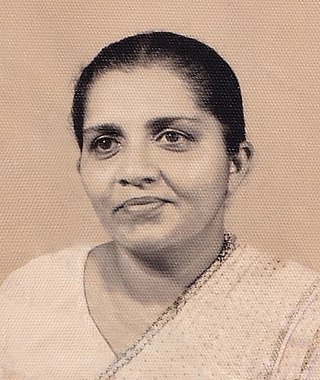
Violet Vivienne Goonewardene, commonly known as "Vivi", was a Sri Lankan anti-colonial activist and prominent politician, serving as one of the world's first female ministers. A key figure in both the Indian independence movement and the Sri Lankan independence movement, Goonewardene was a prominent member on the non-aligned stage, where she fought against perceived injustices and was critical of the Middle East diplomacy sponsored by the United States. Goonewardene was the first and, to date, only female National Hero of Sri Lanka. By her death, she was one of the Left's most vibrant personalities, and the foremost female figure in the Sri Lankan leftist movement.

Doreen Wickremasinghe was a British leftist who became a prominent Communist politician in Sri Lanka and a Member of Parliament (MP). She was one of the handful of European Radicals in Sri Lanka.
Deshamanya Radhika Coomaraswamy is a Sri Lankan lawyer, diplomat and human rights advocate who served as an Under-Secretary General and Special Representative for Children and Armed Conflict from 2006 to 2012. Secretary-General Kofi Annan appointed her to the position in April 2006. In 1994, she was appointed the United Nations’ Special Rapporteur on Violence Against Women — the first under this mandate. Her appointment marked the first time that violence against women was conceptualized as a political issue internationally.

The Rashtra Sevika Samiti is a Hindu nationalist women's organisation that parallels the Rashtriya Swayamsevak Sangh (RSS) for men. Even though it is often referred to as the "Sister" of the RSS, the organisation claims that it is independent of the RSS while sharing its ideology. Membership and leadership is embraced to women and its activities are directed to nationalist devotion and mobilisation of Hindu women.
Murugesapillai Koneswary or Koneswary Murugesapillai was a minority Sri Lankan Tamil woman who was raped and killed on 17 May 1997 as part of the ongoing Sri Lankan civil war. The rape and murder received extensive local and international attention.

Professor Maithree Wickremesinghe is the current First Lady of Sri Lanka as the wife of President Ranil Wickremesinghe. She is a Sri Lankan academic, writer, and professor of English at the University of Kelaniya. She specializes in gender and women's studies.
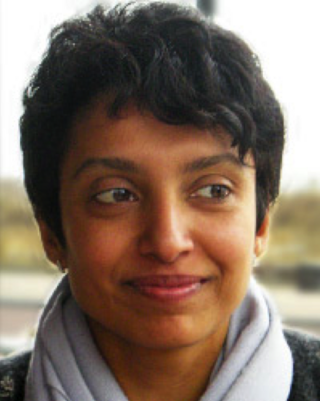
Nira Konjit Wickramasinghe is professor of modern South Asian studies at Leiden University in the Netherlands and a well known international academic. She was a professor in the department of history and international relations, University of Colombo, Sri Lanka, until 2009. She grew up in Paris and studied at the University of Paris IV - Sorbonne from 1981 to 1984 and at the University of Oxford from 1985 to 1989, where she earned her doctorate in modern history. She joined the University of Colombo in 1990 and taught there until 2009. She has been a World Bank Robert McNamara fellow, a Fulbright senior scholar at New York University, a visiting professor at the Ecole des Hautes Etudes en Sciences Sociales in Paris, and more recently British Academy Fellow at St Antony's College, Oxford. She is currently working on a history of the reception of the sewing machine in colonial Sri Lanka, a topic which she researched while on sabbatical at the Shelby Cullom Davis Center for Historical Studies Princeton University in 2008–2009.
Agampodi Torontal Paulus de Zoysa, popularly as A. P. de Zoysa, was a Sri Lankan social reformer, pre-colonial era politician and a Buddhist scholar.

Asoka Bandarage is a Sri Lankan academic specializing in international development, political economy, women and gender studies, multiculturalism, conflict analysis and resolution, peace and security, South Asia, Sri Lanka, population and ecology. She has headed the Women's Studies Program at Mount Holyoke College and also taught at institutions including Georgetown University’s Public Policy Institute in Washington, DC. She is also a yoga instructor.
Ezlynn Isabel Améliè Deraniyagala was a Sri Lankan lawyer and feminist, who was the first female barrister in the country.
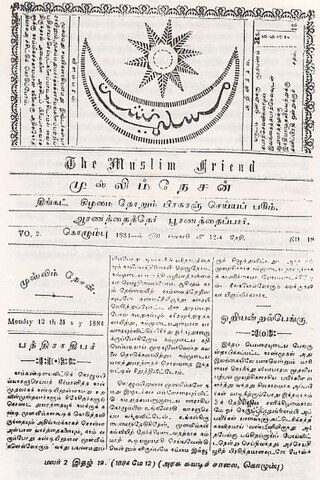
Muslim Nesan was an Arwi and English-language weekly newspaper, published from Colombo, British Ceylon between 1882 and 1889. M. C. Siddi Lebbe was the publisher, owner and editor of Muslim Nesan. He founded Muslim Nesan in Kandy in December 1882. The name of the publication was possibly inspired by the journal Ilankai Nesan of Arumuka Navalar. In setting up the newspaper Cittilevvai was inspired by the Aligarh Movement, Navalar and Colonel Henry Steel Olcott. The first issue appeared on 21 December 1882.

Gender inequality in Sri Lanka is centered on the inequalities that arise between men and women in Sri Lanka. Specifically, these inequalities affect many aspects of women's lives, starting with sex-selective abortions and male preferences, then education and schooling in childhood, which influence job opportunities, property rights, access to health and political participation in adulthood. While Sri Lanka is ranked well on several gender equality indices in comparison to other countries in the region, there are also some sources that question the verity of these indices. However, globally, Sri Lanka ranks relatively lower on gender equality indices. Overall, this pattern of social history that disempowers females produces a cycle of undervaluing females, providing only secondary access to health care and schooling and thus fewer opportunities to take on high level jobs or training, which then exacerbates the issue of low political participation and lowered social rights, a cycle studied and noted on by Dr. Elaine Enarson, a disaster sociologist studying the connection between disaster and the role of women.
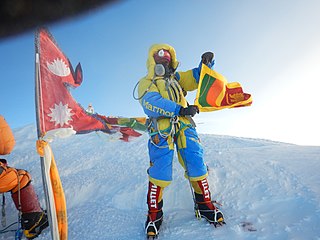
Jayanthi Kuru-Utumpala is a Sri Lankan women’s rights activist with 20 years of experience and a rock climber / mountaineer for nearly as long. She has worked at national, regional, and global levels as a technical advisor, advocate, trainer, researcher, and program manager on issues relating to gender, gender-based violence, sexuality, masculinity, women’s human rights, and more recently, women in sports. In 2016, she became the first Sri Lankan to summit Mount Everest. In recognition of this achievement, from 2016-2019 she was appointed the Goodwill Ambassador for Women's Rights by the Sri Lankan Ministry of Women's Affairs. In 2017, she was also included in the BBC’s list of 100 inspiring and influential women from around the world. In 2023, she was the recipient of the International Olympic Committee’s Gender Equality, Diversity and Inclusion Champions Award for Asia(Olympic Council of Asia). Since returning from Everest, she has delivered over 500 motivational speeches, to schools, universities, clubs, professional sports teams, corporate entities, government, and non-governmental organizations, as well as the military and police. She is currently the Gender and Human Rights Advisor at the Family Planning Association in Sri Lanka, working to address stigma and discrimination faced by people seeking HIV services, and is a co-creator of ‘Delete Nothing’ – a local web-based initiative aimed at addressing online gender-based violence in Sri Lanka. Jayanthi serves on several boards and is the current Chairperson of the Women and Media Collective and the International Centre for Ethnic Studies. She is also a trustee of the ‘Women of the World Foundation’, a UK-based charity. Jayanthi holds an MA in Gender Studies from the University of Sussex (UK) and a post graduate diploma in Women’s Studies from the University of Colombo. For more details, find her on LinkedIn.
Neloufer de Mel is a professor of English at the University of Colombo in Sri Lanka and a feminist scholar.
Nancy M. Wijekoon was a Sri Lankan poet and activist during the Sri Lankan independence movement.
Pradeep Jeganathan is a Sri Lankan academic, anthropologist, and writer. He is known for his work on South Asian studies with an emphasis on nationalism, ethnicity, and violence.